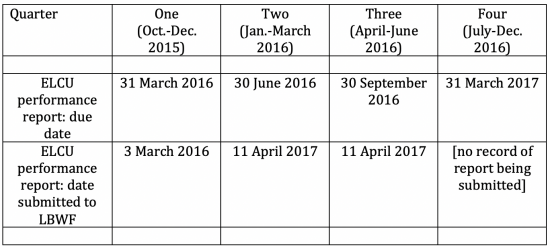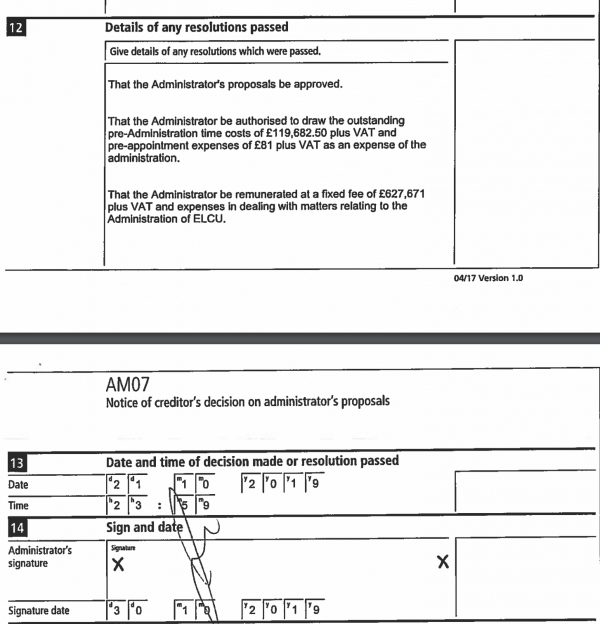LBWF and the East London Credit Union: yet more disturbing details emerge
This blog’s investigation into the 2019 collapse of LBWF favourite the East London Credit Union (ELCU) continues to generate revelations, and what follows is a brief roundup of the most noteworthy, grouped under four headings.
LBWF’s initial decision to give ELCU £500,000 in 2014
At the Council Meeting of 16 October 2014, and with standing orders suspended, the Leader, Cllr. Chris Robbins, made a verbal ‘Autumn Statement’ which, ‘[f]ollowing a consultation with residents about the Council’s budgets and priorities’, listed ‘his five priorities for the coming months’, and included:
‘The Council would [sic] inject £500,000 into a Credit Union facility. This will provide residents with a safe way to borrow money if they need it, helping them to avoid being forced to use other high interest alternatives’.
According to recent correspondence with LBWF, this short paragraph was – on its own, and without further elaboration – accepted to be sufficient authorisation for officers to begin actioning the transfer.
Establishing the legal basis for the transfer
In the following months, ELCU vigorously pushed for the promised funding, underlining that Cllr. Robbins’ verbal commitment had been repeated in Waltham Forest News and subsequently cited in ‘an email circulation to Labour Party members across the borough’.
However, the LBWF officer charged with the practicalities, Head of Revenue and Benefits Nalda Russell-Stowe, was adamant that she needed to obtain legal advice before proceeding, explaining in April 2015: ‘I am not aware of the Council doing anything like this before so want to be sure that I don’t inadvertently break any rules’.
In the end, it was not until 12 August 2015 that the two sides signed what was described as a ‘Grant Agreement’.
Requirement that ELCU provide due diligence material
Paras 5.4 and 6.4 of the Grant Agreement required ELCU to forward an array of due diligence material:
Nevertheless, in recent correspondence, LBWF has admitted that none of this material was either ‘provided by ELCU’ or ‘pursued by the Council’.
Monitoring of expenditure
LBWF contracted to hand over tranches of the £500,000 grant in advance, quarter by quarter, while in return, ELCU was to submit progress reports, as detailed in the Grant Agreement’s paragraph 6.2:
‘The Recipient shall provide the Funder with a financial report and a monitoring and evaluation report on its use of the Grant and delivery of the project every quarter and in such formats as the Funder may reasonably require…The Recipient shall provide the Funder with each report within three months of the last day of the quarter to which it relates’.
Initially, this arrangement went to plan. LBWF transferred the first tranche of funding at the beginning of Quarter One, ‘to kick start the project’; followed with the second three months later; and then ELCU submitted a performance report to time.
But as the table below illustrates, subsequently the stipulated schedule simply collapsed:
Moreover, when in April 2017 ELCU finally did submit its Quarter Two and Three performance reports, there was no disguising the fact that some of the agreed targets had been missed, a few spectacularly (for further details, see a previous post, ‘The East London Credit Union: some new facts, but confusion, maybe evasion, persists’, referenced below).
This posed LBWF with a problem, and Ms. Russell-Stowe e-mailed Director of Finance John Turnbull seeking his advice:
[ELCU] has now provided an updated report for Q2 and Q3… The report shows that whilst they have been successful with the new online platform and loans to residents, they have been unsuccessful in achieving the targets for businesses and the hard to reach communities…Can you please confirm that you are happy to continue funding this project. If yes may I suggest that we change tack from payment in advance and make payment by success which would mean that we restrict the amount we pay for Q3 and recover monies paid in advance for Q2 for the areas that were not achieved’.
Mr. Turnbull’s response is unrecorded (either he didn’t commit to paper or when questioned under the Freedom of Information Act LBWF has illegitimately withheld his correspondence), but on 17 July 2017, Ms Russell-Stowe felt confident enough to advise ELCU how matters would be settled:
‘I have now been able to obtain agreement from my Director to release an indicative payment of £34,500 for Q3 and 4 per the attached spread sheet. In deciding the amount to be paid I have compared your performance for Q1-3 against the projected targets and as payments for each quarter excluding Q1 was based on you successfully delivering against the objectives I have adjusted the sum to be paid to match what has been achieved by the project over the period. I realise that this means that I’ve made a certain level of assumptions’. Her suggestion, she reassured ELCU, was an ‘interim measure’, which could be adjusted ‘on production of the final report for Q4’.
And, in so far as LBWF is now prepared to reveal, that – bar some minor formalities – was that.
Whichever way it is approached, this amounts to a dispiriting tale. In a nutshell, LBWF signed a legal contract with ELCU, but then readily set aside some of its key constituent obligations. Furthermore, no less a figure than Mr. Turnbull, right at the top of the LBWF hierarchy, seems to have been party to at least some aspects of the relevant decision-making.
Quite why LBWF handled ELCU with such indulgence remains to be established.
What can be said is that, to anyone with a modicum of curiosity, ELCU was never a good bet, certainly not the kind of organisation to be showered with public money yet excused reporting as to how it was being spent.
That ELCU did not report annual accounts to the regulator, the Financial Conduct Authority, in any of the three years before LBWF awarded it £500,000 alone should have been enough to set alarm bells ringing.
So what went wrong?
Perhaps officers were seduced by ELCU’s much hyped philanthropic mission. Perhaps they were in some way deceived. Or was it that they knew all too well this was a project closely associated with both the then Leader and other Labour bigwigs, and dared not rock the boat?
Only time will tell.
ADDENDUM
Connoisseurs of the administration process will be interested to learn that, when last discussed in October 2019, ELCU’s creditors agreed to pay ELCU’s administrator, Cork Gulley LLP, the following sums for its work:




